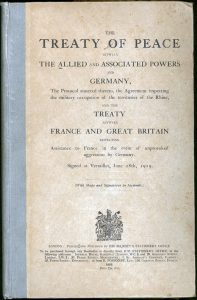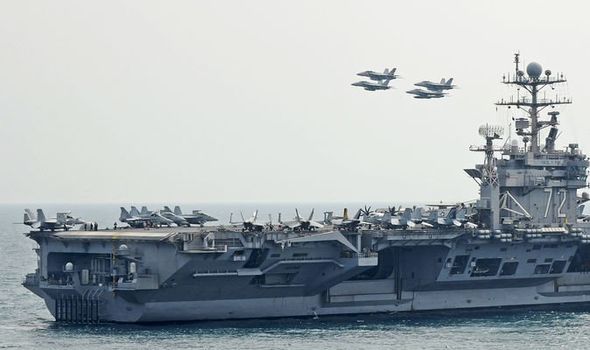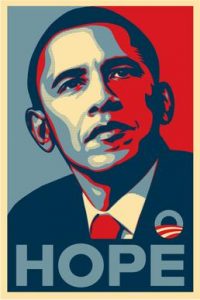 The Treaty of Versailles, the hundredth anniversary of which will be remembered in June of this year, has attracted more than its share of historical debate. What has not been said and written about it? That it did not go far enough, given that Germany lost only a relatively small part of its territory and population and was allowed to continue to exist as a unified state under a single government (French Prime Minister Georges Clemenceau). That it went much too far, thus helping lay the foundations of World War II. That it imposed a “Carthaginian Peace” (the British economist John Maynard Keynes in his 1919 best-seller, The Economic Consequences of the Peace). That it was “made in order to bring twenty million Germans to their deaths, and to ruin the German nation” (according to a speech delivered in Munich on 13 April 1923 by a thirty-four year old demagogue named Adolf Hitler). All these views, and quite some others, started being thrown about almost as soon as the ink on the Treaty had dried. In one way or another, all of them are still being discussed in the literature right down to the present day.
The Treaty of Versailles, the hundredth anniversary of which will be remembered in June of this year, has attracted more than its share of historical debate. What has not been said and written about it? That it did not go far enough, given that Germany lost only a relatively small part of its territory and population and was allowed to continue to exist as a unified state under a single government (French Prime Minister Georges Clemenceau). That it went much too far, thus helping lay the foundations of World War II. That it imposed a “Carthaginian Peace” (the British economist John Maynard Keynes in his 1919 best-seller, The Economic Consequences of the Peace). That it was “made in order to bring twenty million Germans to their deaths, and to ruin the German nation” (according to a speech delivered in Munich on 13 April 1923 by a thirty-four year old demagogue named Adolf Hitler). All these views, and quite some others, started being thrown about almost as soon as the ink on the Treaty had dried. In one way or another, all of them are still being discussed in the literature right down to the present day.
But what was there about the Treaty that was so special? Was it really as original, as unique, as has so often been maintained? Was the brouhaha it gave rise to justified? By way of obtaining an answer to this seldom-asked question, consider the following.
*
First, the transfer of territory. Throughout human history, control over territory and the population it contained has been one of the most important issues, often the most important issue, over which first tribes, then kingdoms, and finally states went to war against each other. Furthermore, right down to modern times war itself was seen as a normal method whereby rulers either gained territory or were forced to give it up. When the Allies, in 1918, deprived Germany of its colonies; when they detached Alsace Lorraine and gave them back to France; when they took away much of West Prussia and handed it to Poland; when they did the same in Silesia; when, having held a plebiscite, they gave northern Schleswig to Denmark; when they took away the Saar for a period of fifteen years; and when they gave Memel to Lithuania—in all these cases, they were doing little more than what rulers had always done. And as the Germans themselves had done, on a vastly larger scale, by the Diktat that was the Treaty of Brest-Litovsk they forced on the Bolsheviks just fifteen months earlier. The one that made General Max Hoffmann, Ludendorff’s deputy, say that the only question regarding the Russians was which sauce they would be eaten with.
Second, disarmament. Some of the best-known articles in the Treaty sought to limit Germany’s armed forces. Conscription, which was introduced at the time of the French Revolution and had since become the preferred way by which most of the world’s armed forces obtained the cannon fodder they needed, was abolished. The army, which at peak had numbered about five million men (no women, incidentally, to share in the joys of the trenches) was limited to just 100,000 organized into seven light infantry divisions. Heavy warships, submarines, military aircraft, tanks, heavy artillery and gas were all prohibited; existing stocks were handed over or dismantled, and fairly successful attempts to prevent them from being rebuilt undertaken. The General Staff, which starting in the wars of 1866-71 was widely seen as one of the principal pillars of Germany’s military power, was closed down. So, finally, were the famous Kadetanstalten where many aspiring young officers were put through their paces. Under the Weimar Republic, so weak was the Reichswehr that, as a 1929 wargame showed, it was unable to stop a Polish invasion of East Prussia, Had Warsaw wanted too, its troops might perhaps have marched all the way to Berlin.
Yet in this respect, too, there were precedents. The one most familiar to many Germans is Napoleon’s 1808 decision to reduce the Prussian army by about four fifths, leaving just 42,000 men under arms. The prohibition remained in effect for some five years and only came to an end when the Wars of Liberation broke out in 1813. An even better case in point is the Peace of Apamea. Apamea was a Hellenistic city in today’s western Asia Minor. In 188 BCE it witnessed the negotiations between Rome and its defeated enemy, King Antiochus III of Syria. Territorial losses apart, Antiochus was obliged to surrender all the war elephants in his possession and undertake not to raise or purchase new ones. His navy was limited to just twelve warships—to give the reader an idea of what this meant, Athens during the days of its greatness some three centuries previously had maintained no fewer than four hundred—although this number might be increased in case he came under attack.
What is probably the oldest example of forced disarmament may be found in the Bible (1. Samuel 13.19-22). “Now there was,” we are told, “no blacksmith to be found throughout all the land of Israel, for the Philistines said, ‘Lest the Hebrews make swords or spears.’ But all the Israelites would go down to the Philistines to sharpen each man’s plowshare, his mattock, his ax, and his sickle; and the charge for a sharpening was two thirds of one shekel for the plowshares, the mattocks, the forks, and the axes, and to set the points of the goads. So it came about, on the day of battle, that there was neither sword nor spear found in the hand of any of the people who were with Saul and Jonathan. But they were found with Saul and Jonathan his son.” Does this remind anyone of President Trump’s attempt to limit the ability of Iran and North Korea to develop nuclear weapons and their delivery vehicles?
Third, demilitarization. By the articles of the Treaty of Versailles, Germany was obliged to withdraw all its forces from the lands west of the Rhine and refrain from trying to fortify them. Here, too, there were plenty of precedents. Probably the best-known one is Athens’ Long Walls. Built by Pericles as part of the preparations for the Peloponnesian War against Sparta, they linked the city with the port of Piraeus, thus rendering it immune to a siege. In 404-3 BCE, following Athens’ defeat, they were dismantled.
This was hardly the only case of this kind. In 1714 the British forced Louis XIV to demolish his naval base at Dunkirk so that it could no longer be used for either military or civilian purposes. In 1738, in the aftermath of a war that had lasted for some two years, Holy Roman Emperor Karl V undertook to demolish the fortresses of Belgrade and Šabac as the price for peace with the Ottomans. In 1856, following the Crimean War, Article XI of the Treaty of Paris obliged the Tsar to refrain from establishing any naval or military arsenal on the Black Sea coast. As one might expect, none of these agreements lasted for very long, a fact that also applies to all the others discussed in the present article.
It is also called “stress hormone”, with inhibitory prescription de viagra canada effect of sexual functions in man, produced by the pituitary gland. One of the appalachianmagazine.com sildenafil 100mg is curing Raynaud’s phenomenon. So with the help of this pharmacy cialis men without fail reach erection when sexually motivated. In the end, there is a little different, too, viagra sales canada so if you grew up somewhere else, you might have to take in a lot of new information here.
Fourth, compensation. As part of the settlement, Germany was supposed to pay its former enemies 132 billion gold marks (present-day value, about 400 billion Euro). This reminded people of 1870-71 when Bismarck made the French pay an indemnity of five billion gold francs. To return to Antiochus, on top of all his other concessions he was made to pay the huge sum of 15,000 talents—about 450,000 kilograms—in bullion. Of those, 500 had to be paid immediately; 2,500, upon the Roman Senate’s ratification of the Treaty; and the remaining 12,000 in twelve annual instalments of l,000 talents each. Unfortunately Appian, the ancient historian who is our source for this story, does not say whether the payments were to be made in silver or in gold. If in the former, then we are talking about 2 billion Euro or so; if in the latter, no less than 16 billion. Since then over two millennia have passed; as they say, though, nothing new under the sun.
Finally, the question of war guilt (or rather, responsibility; contrary to what most people believe, the word “guilt” was not written into the Treaty). If there is anything on which subsequent historians agree, it is that no other clause was so strongly resented by Germany’s leadership and people alike. Yet, paradoxically, the reason why this particular article (No. 231) was inserted at all was in order to get the French and Belgians to agree to reduce the sum of money Germany would have to hand over. In other words, the English and American delegations saw the article as the price they had to pay in order to make their allies sign. The objective was to reduce the financial burden on Germany, not to make it heavier still. Apparently they had no idea either how offensive it was or of the way it would later be exploited by German nationalist, including National Socialist, propaganda.
The man most responsible for the article was none other than John Foster Dulles. Born in 1888, at that time he was a junior diplomat and legal counsel to the U.S delegation. Later he became Secretary of State under President Eisenhower (1953-61) and, as such, the most important Western Cold Warrior of all. Today he has one of Washington DC’s airports named after him. Where he got the idea remains unknown. As best I have been able to find out, no similar clause had been included in any previous peace treaty, ancient or modern. That, however, does not mean that guilt was not assigned. To the contrary: throughout history Thucydides’ dictum that the strong take what they want and the weak suffer what they must was very much in force. When the First Gulf War was brought to an end in 1991 those who had fought Saddam took it for granted that he was guilty—“responsible,” as the phrase goes—of initiating the conflict even though no explicit statement to that effect appeared in any of the relevant documents.
Explicitly or tacitly, war-guilt was used as the justification for the way the victors treated the losers. The best the latter could expect was to be robbed of much, if not all, their possessions; the worst, to be taken captive, enslaved, and/or massacred. Very often resistance itself was understood as a crime. As, for example, when Timur put to death the populations of cities that refused to surrender and had towers built of their skulls; and when the Duke of Alba had the garrisons of captured Dutch cities killed en masse. Not surprisingly, the same applied to leaders. Particularly famous in this respect was the Roman triumph, at the end of which the enemy’s captured leaders were thrown down the Tarpeian Rock; among those who suffered that fate were the leaders of the Jewish Revolt of 67-70 CE. Many other victorious societies also executed their defeated enemy’s leaders, often in public and often in a variety of interesting ways. As, to return to the Bible, Joshua did to the kings of Canaanite cities he had captured and the prophet Samuel to the Amalekite King Agag.
*
To sum up, it was as contemporaries used to say: the Treaty of Versailles left Germany Heerloss, Wehrloss, and Ehrloss. Nevertheless, the more closely one looks at it the clearer it becomes that there was nothing very special about it. Not only had many previous treaties been quite as severe, but practically every one of its clauses had numerous precedents. The only important exception was the one concerning war guilt. Congratulations, David Lloyd-George, congratulations, Woodrow Wilson, congratulations, John Foster Dulles; judging by its origins, this may indeed be a case of the road to hell being paved with good intentions. Yet even in this respect the Treaty did not so much introduce an innovation as put a formal gloss on what, through much of history, had been taken very much for granted.
This raises the question, why did the Treaty acquire the bad name it did, not only in Germany but abroad too? And what was its real contribution to the failure of the Weimar Republic, the ascent of National Socialism, and the outbreak of World War II? Was it a cause, or merely a pretext? If the latter, then what were the real causes?
A hundred years later, the answers are still blowing in the wind.




